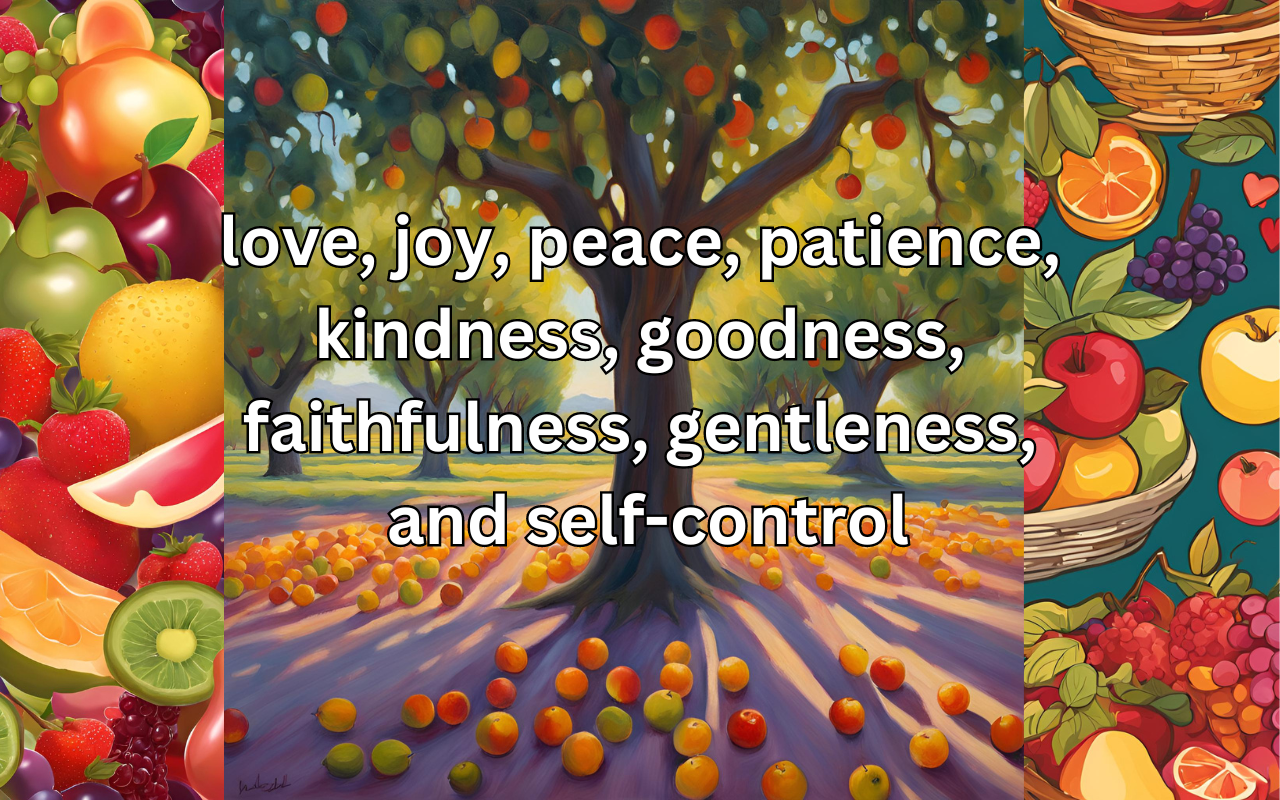
When we think of spiritual growth, we often envision a journey marked by transformation, a shift in character, and an ability to live above life’s pressures. In Galatians 5:22-23, the apostle Paul gives us a clear picture of what this growth looks like. He lists the fruits of the Spirit—love, joy, peace, patience, kindness, goodness, faithfulness, gentleness, and self-control—as evidence of a life led by the Spirit. But how do we cultivate these fruits in our everyday lives? How can we be vessels of love and joy, even when life’s circumstances challenge us? Let’s take a deeper look at these fruits and how we can actively nurture them in our personal and spiritual growth.
1. Love: The Foundation of It All
Love is the foundation for all the other fruits. Without love, joy is fleeting, and patience is impossible. In 1 Corinthians 13:13, we read that “the greatest of these is love,” and it’s easy to see why. Love isn’t just a feeling; it’s an action, a choice we make daily. In our busy, fast-paced lives, we often think love is something that happens to us, but Paul tells us that love is a fruit we must cultivate.
Practical Tip: Start your day by asking yourself, “How can I show love today?” This simple question can change how you interact with others—whether it’s through acts of kindness, compassion, or a listening ear.
2. Joy: Choosing Happiness in Every Season
Joy is a deep-rooted sense of well-being, independent of circumstances. Unlike happiness, which is often tied to what happens around us, joy is the result of a heart connected to God. Even in trials, we can choose to find joy in the promises of God.
Practical Tip: Reflect on what brings you joy in your spiritual walk. Is it worship, prayer, or quiet time with God? Make these practices a regular part of your day to maintain your joy.
3. Peace: Finding Calm in the Chaos
In today’s world, peace often feels elusive. But the peace Paul speaks of is not dependent on external factors. It’s a peace that comes from trusting God even when everything around us feels uncertain. Philippians 4:7 promises us that the “peace of God, which transcends all understanding, will guard your hearts and your minds in Christ Jesus.”
Practical Tip: When you feel overwhelmed, pause and pray. Surrender your anxiety to God and trust that His peace will fill the gaps.
4. Patience: Waiting With Grace
Patience is one of the hardest fruits to cultivate, especially in a world of instant gratification. We are wired to expect quick results, whether it’s in our careers, relationships, or personal goals. But the Spirit teaches us to wait with grace, trusting that God’s timing is always perfect.
Practical Tip: Practice patience by embracing life’s delays. Instead of reacting in frustration, try to view waiting as an opportunity to trust God more deeply.
5. Kindness and Goodness: Reflecting God’s Heart
Kindness and goodness often go hand in hand. They are outward expressions of a heart that mirrors God’s love for humanity. Kindness involves showing empathy, compassion, and care, while goodness reflects integrity, moral righteousness, and a desire to do what is right.
Practical Tip: Look for small ways to show kindness in your day, whether it’s a word of encouragement to a friend or helping a neighbor in need. Your goodness will reflect God’s love.
6. Faithfulness: Remaining Steadfast
Faithfulness is about consistency in our walk with God and in our relationships with others. It’s about staying true to God’s Word, even when the world around us pressures us to compromise.
Practical Tip: Commit to small, consistent acts of faithfulness, like reading scripture daily or maintaining a prayer journal. These habits will strengthen your connection to God.
7. Gentleness: Power Under Control
Gentleness isn’t weakness; it’s strength under control. It’s the ability to respond to others with care, even when they don’t deserve it. In a world where aggression is often seen as power, gentleness reflects the character of Christ, who was both powerful and gentle.
Practical Tip: When conflicts arise, practice responding with gentleness. This may mean choosing to listen before speaking or showing empathy rather than reacting in anger.
8. Self-Control: Mastering Our Desires
Self-control is the ability to resist temptations and impulses that don’t align with God’s will. Whether it’s controlling our words, thoughts, or actions, self-control is essential for spiritual growth.
Practical Tip: Identify one area in your life where you struggle with self-control and commit it to God. Ask for His strength to resist and redirect your focus toward what honors Him.
Conclusion: Living Out the Fruits of the Spirit
The fruits of the Spirit are not just ideals to aspire to; they are evidence of a life transformed by God. As we grow closer to Him, these fruits will naturally become a part of our daily lives, shaping how we interact with the world around us. The more we nurture these fruits, the more we will experience the abundant life God has promised us. So, let’s strive to live a life filled with love, joy, peace, patience, kindness, goodness, faithfulness, gentleness, and self-control. Not only will it transform our own hearts, but it will also have a ripple effect on everyone we encounter.
Call to Action:
Take a moment to reflect on which fruit of the Spirit you want to grow in this season. Ask God to help you cultivate that fruit and watch how it transforms your life and those around you. By focusing on this transformative scripture from Galatians 5:22-23, you offer a powerful tool for spiritual growth. Each fruit serves as a guide, helping Christians live more like Christ in every aspect of life.
